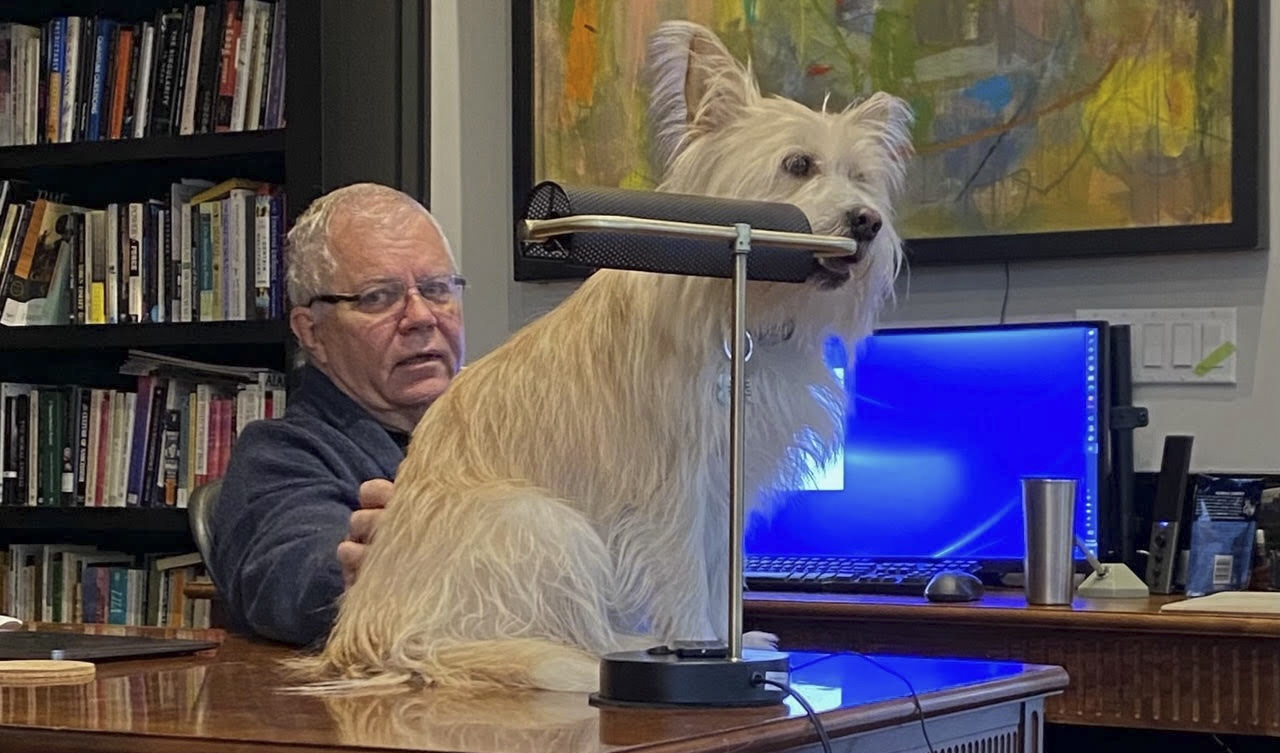The other day, former Springfield Mayor Tom Carlson was here in our newsroom in the basement of Freudenberger House, on the Missouri State University campus.
Carlson is the founder of the Hauxeda and also its leading investor to date. When he’s here, he’s usually with his dog Sparky.

Carlson was the city’s longest-serving mayor. He previously held the office from 1987 to 1993. He stepped away from politics, but came back and was re-elected mayor in April 2001 and again in 2003, 2005 and 2007.
Since I traffic in stories, I asked him for a good one — something bizarre, funny or hard-to-believe — from his mayoral days.
“Well, there was the time someone put out a contract to have me killed,” Carlson said.
What?
He continued: “The headline was ‘Mayor Marked for Murder.’”
I found that headline across the top of the July 12, 1991 Springfield News-Leader.
Carlson was mayor but the threat did not come from serving in that office. He also is a lawyer; the threat came from his role as an appointed trustee in a bankruptcy case.
No one was ever charged with trying to hire someone to kill Carlson.
But a woman named Joann Cunningham apparently thought about it, according to news accounts in 1991 and 1992, before deciding she wanted someone else dead, instead.
Cunningham’s husband was a former Springfield businessman by the name of Steven Babbidge, who in 1991 was serving time in federal prison for committing what was then described as one of the largest cases of investment fraud in Missouri history.
He had been sentenced to three years and five months in prison.
His fraud involved the sale of mobile home parks in Missouri from April 1987 through July 1989.
A major element of that fraud was that the mobile home parks did not exist.
He took money for building them; did not build them; and took more money to build the next one (which he didn’t build) and gave some of that back to investors; and so on and so on.
Carlson recalls that Babbidge would show investors mobile home parks that he did not build and tell them that he had.
‘Victim' agrees to stage his own killing
Well, Babbidge ran into financial difficulties and filed for bankruptcy in federal court and Carlson, as a Springfield lawyer, was appointed the bankruptcy trustee.
It is the trustee’s job to evaluate and make recommendations about debtor demands in accordance with the U.S. Bankruptcy Code.
According to news reports at the time, Babbidge did not like the way Carlson oversaw his bankruptcy and told his wife (Cunningham) of his displeasure.
A 1992 News-Leader story quotes David C. Jones, who was then an assistant U.S. attorney (and is now a Greene County circuit judge):
“There is some indication that Mrs. Cunningham felt Tom Carlson was not treating her husband the way she felt he should be treated in the bankruptcy court,” Jones said. “The initial indication was that the murder was to be Tom Carlson’s.”
Another person who was thought to be a potential target was Monty Sowersby, then fire chief of the Ebenezer Fire Protection District.
No one was ever murdered because the hitman Cunningham thought she had hired was actually David True, an undercover special agent with the Kansas City Bureau of Alcohol, Tobacco and Firearms.
Instead of Carlson, Cunningham told True she wanted him to kill Erik Ikemeier, a former business partner of hers.
Cunningham and another business associate, Robert Cook, who back then was a fire captain with the Ebenezer Fire Protection District, would eventually be convicted of arson.
They set a fire on Feb. 1, 1991, that destroyed Cunningham’s convenience store — BZ Short Stop on Highway 13.
The money from the insurance settlement from the fire would have been used, according to news stories, to find treasure and gold “worth millions” that was supposed to be hidden throughout the country, including a large amount in the St. Louis area.
One story said, “One site in the St. Louis area was supposed to have $30 million.”
True testified he accepted the offer to kill Ikemeier, and Cunningham gave him a 20-gauge shotgun, a .25-caliber pistol and a solid gold watch to seal the deal. He would be paid $25,000 later — and would return the watch after the deed was done.
Police went to Ikemeier and told him someone had hired a hitman, who was actually an undercover agent, to kill him.
Ikemeier agreed to have his death staged on June 18, 1991. Cunningham’s alibi was going to be that she was playing bingo.
Ketchup and other items were used as fake blood; photos of the “victim” were taken; and Ikemeier loaned the “hitman” his wallet.
True, the undercover agent, showed Cunningham two color photos of the “victim’s” apparently bloody body and gave her Ikemeier’s wallet.
Cunningham took the items and as she walked away, True identified himself as law enforcement and arrested her.
Cook and Cunningham were both convicted of crimes related to the arson and the attempted murder-for-hire.
This is Pokin Around Column No. 20

